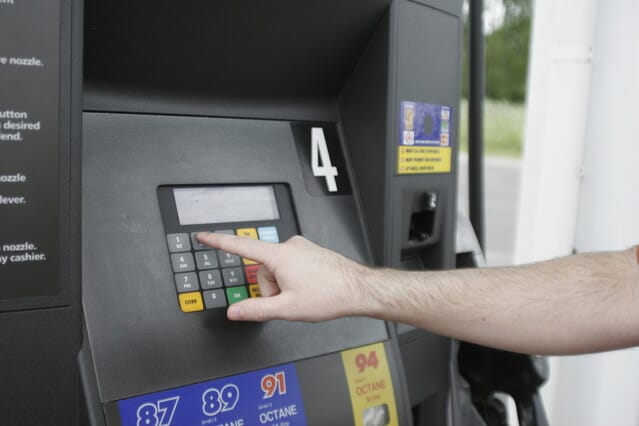A large supermarket chain near my abode also runs a convenience store-style gas station in front of the supermarket. They run a thoroughly marketed promotion whereby customers receive a discount for gas based on how much money they spend on groceries.
Having just dropped a serious chunk of change on groceries, I received a fuel coupon for a discount of $0.23/gallon. Nice, I thought. That’s almost four bucks off on my next tank of gas.
A couple of days later, I went back to their gas station. The fuel discount was printed out at the bottom of my grocery receipt, but it didn’t say what to do with the coupon. So I pulled up to the super-modern, uber-convenient pumps and saw the sign that read: “Must Pre-Pay or Use Card.” I shrugged and used my card, as I usually do at pumps with a card slot. I figured they would give me the discount inside the convenience store. How on earth else could it done?

Fifteen point eight gallons later, I sauntered inside the store, receipt in hand. At the counter, the conversation went like this:
Me: I have this discount coupon here. (handing him the receipt)
Clerk: Did you already pay?
Me: Yup. Receipt right here.
Clerk: Then I can’t give you the discount. You have to pay inside.
Me: But the pump said I had to pre-pay or use my card. I used my card.
Clerk: That row of pumps is pre-pay. You should have used this other row.
So I chose not to cause a scene and shuffled off to chew on my frustration. Of course, my coupon expired the next day.
Am I going back? Should I go back?
Let’s analyze the ways this promotion failed this customer.
Great marketing does not equal great execution. You have to do what you say you’ll do. And you have to do it without throwing up roadblocks. A benefit behind roadblocks is not a benefit at all.
If the customer thinks he’s going to get a benefit, and then finds it’s walled up behind fine print, or seemingly arbitrary rules, he is going to go away and not look back.
I don’t expect that my personal boycott of this chain matters to them, and I’m not that bitter, but how many other customers are going to walk away, dissatisfied? Maybe readers will think me unreasonable, but how much inconvenience are customers willing to put up with?
What is the lesson here for all marketers?








Same thing happened to me. I never use that gas station anymore, and rarely shop at their grocery store.
Another example: My local Valero gas station has flyers taped to the Regular pump handles touting, “Enjoy Premium Same $$$.” I don’t use Premium gas. My car is not designed for that octane level. I’m not about to fight with a piece of paper just for a fill-up, or walk inside to ask a busy clerk if I can still get Regular (or are they out of it?).
So I went down the street. Valero lost a sale, not to mention reputation points.
It’s an interesting approach, one I haven’t seen yet. If they’re offering premium gas at regular rates, then it’s clearly a great deal for Mercedes and BMW owners – and likely to generate loyalty. (Then again, many people who own cars that require premium gas are more likely motivated by convenience rather than price.) Like you, I would have driven elsewhere. No sense in spoiling my little Civic.
In your shoes, I’d have insisted on speaking to someone with the authority to give me satisfaction. In fact, I’d have gone right to the top, or as close to the top as possible—to a C-level executive if possible—because I’m interested not just in the discount, but in changing their policy. I’d have explained the situation; I’d have emphasized that I didn’t want to make trouble for the clerk; I’d have insisted on the promised discount. I’d then have explained to the C-level executive exactly what you’ve explained to us here: that throwing up roadblocks in front of a benefit is no benefit at all; that it makes the customer believe that you’re deliberately cheating him. Insist that you want not only your discount, but his assurance that the company will henceforth make its discounts easier to collect.
I commend your passion and desire for justice, Joseph. (Perhaps you should run for office?) In cases such as these, I’m reminded of an anecdote in the late (and great) Randy Pausch’s The Last Lecture, where he decided to walk away from an overpayment of $20 or so because it wasn’t worth his time to go through the hassle of getting the refund.
Once you succeeded in changing store policy, would you then patronize the business? Or would you still go elsewhere because of the negative experience?
Of course I’d go back, if they cured the problem. I’d even pass the word that this was a company that responded well to complaints. That would be an implicit part of the deal. If they didn’t cure, I’d blackguard them all over town and urge everyone to buy their gasoline elsewhere.